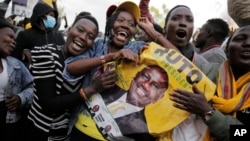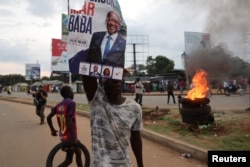Kenya’s election chief has declared Deputy President William Ruto the winner of the close presidential election in the east African country. But four other top election officials said they disowned the result.
Electoral commission chair Wafula Chebukati announced on Monday that Ruto won with 50.49 percent of the vote over 48.85 percent for Raila Odinga. As Chebukati announced the vote count, police stepped in to restore order as two election commissioners were injured because of shouting and fighting. The close election was held nearly a week ago.
Just minutes before the announcement, the commission’s vice chair and three other election commissioners told reporters they could not support the “opaque nature” of the vote counting process. “We cannot take ownership of the result that is going to be announced,” vice chair Juliana Cherera said, without giving details. A representative for Odinga also called the vote counting process “illegal” and claimed “electoral offenses” without giving evidence.
The 77-year-old Odinga is backed by outgoing President Uhuru Kenyatta over Ruto. Now Kenyans will have to wait and see whether Odinga will again contest the results of Tuesday’s election in court. The candidates and their supporters have seven days to dispute the election results. The Supreme Court will have 14 days to rule.
Ruto thanked supporters
The 55-year-old Ruto tried to appeal to struggling Kenyans with messages on the economy over tribal loyalties. He told voters that the election was between outsiders like himself over the “dynasties” of Kenyatta and Odinga. Their fathers were Kenya’s first president and vice president. Odinga has sought the presidency for 25 years.
Both candidates said they wanted to help Kenya’s poor. Odinga promised government money to families under the poverty line. And Ruto promised to spend more than $1 billion a year to increase jobs in a country where more than a third of young Kenyans are unemployed.
Kenyan politics is often marked less by issues than by alliances that create a path to power and the wealth that can come from it. On Monday, Ruto thanked Odinga and added that people who had acted against his campaign “have nothing to fear ... There is no room for vengeance.”
Calls for calm, peace
The electoral commission tried to improve its openness in this election. It placed online more than 46,000 documents from around the country. For the first time, the public could follow the election through local media. Individuals gathered and shared their findings as a check on the official process.
The counts showed Ruto ahead, but the race remained close. As Kenyans waited for almost a week for official results, both Odinga and Ruto joined the police, civil society groups and religious leaders to appeal for peace. Past elections have been marked by political violence.
After the 2007 vote, more than 1,000 people were killed after Odinga claimed victory had been stolen from him. Ruto, then Odinga’s ally, was indicted by the International Criminal Court for crimes against humanity for his part in the violence. But the case ended because of accusations that witnesses were threatened.
The 2017 election results were overturned by the high court because of problems with the vote. Odinga boycotted the new vote that followed which Kenyatta won declaring himself the “people’s president.”
The next president will have to deal with a severe economic and social crisis in the country. Poor Kenyans, already dealing with the effects of COVID-19, have been hit with increases in food and fuel prices. In addition to that, extremely dry weather has hurt the country's north, leaving 4.1 million people dependent on food aid.
I’m Mario Ritter, Jr.
Hai Do adapted this report from the Associated Press for VOA Learning English.
___________________________________________________________________
Words in This Story
opaque –adj. difficult to understand or explain
dynasty –n. a family of rulers or a group that ruled over a country for a long period of time
vengeance –n. the act of doing something to hurt someone because that person did something that hurt you or someone else
___________________________________________________________________
We want to hear from you.
We have a new comment system. Here is how it works:
Write your comment in the box.
Under the box, you can see four images for social media accounts. They are for Disqus, Facebook, Twitter and Google.
Click on one image and a box appears. Enter the login for your social media account. Or you may create one on the Disqus system. It is the blue circle with “D” on it. It is free.
Each time you return to comment on the Learning English site, you can use your account and see your comments and replies to them. Our comment policy is here.








Forum